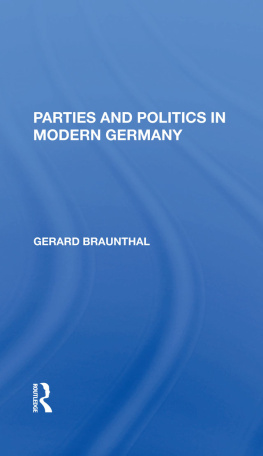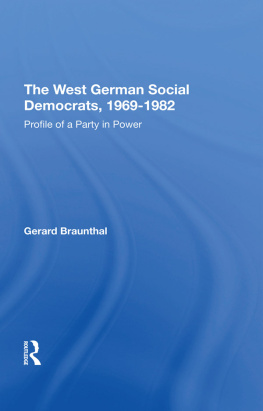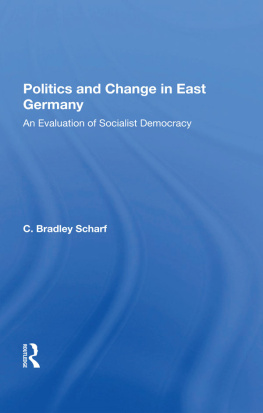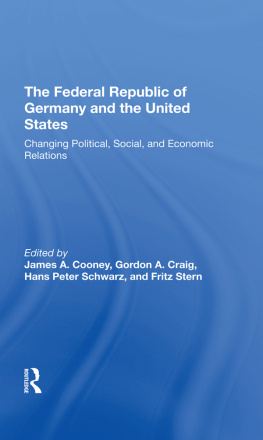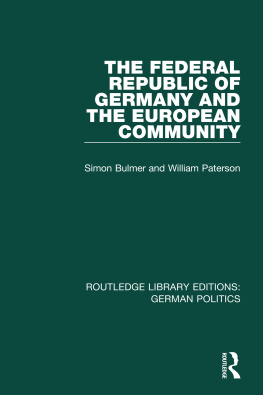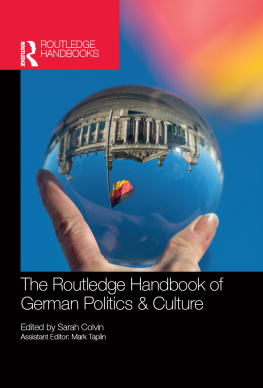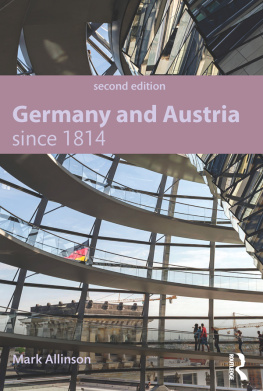Parties and Politics in Modern Germany
Parties and Politics in Modern Germany
Gerard Braunthal
University of Massacbusetts-Amberst
First published 1996 by Westview Press, Inc.
Published 2019 by Routledge
52 Vanderbilt Avenue, New York, NY 10017
2 Park Square, Milton Park, Abingdon, Oxon OX14 4RN
Routledge is an imprint of the Taylor & Francis Group, an informa business
Copyright 1996 Taylor & Francis
All rights reserved. No part of this book may be reprinted or reproduced or utilised in any form or by any electronic, mechanical, or other means, now known or hereafter invented, including photocopying and recording, or in any information storage or retrieval system, without permission in writing from the publishers.
Notice:
Product or corporate names may be trademarks or registered trademarks, and are used only for identification and explanation without intent to infringe.
Library of Congress Cataloging-in-Publication Data
Braunthal, Gerard, 1923
Parties and politics in modern Germany / Gerard Braunthal.
p. cm.
Includes bibliographical references and index.
ISBN 0-8133-2382-7 (hardcover).ISBN 0-8133-2383-5 (pbk.)
1. Political partiesGermanyHistory. 2. GermanyPolitics and government20th century. I. Title.
JN3972.A979B73 1996
324.243'009dc20
95-46210
CIP
ISBN 13: 978-0-367-28227-1 (hbk)
Contents
- PART ONE
An International and National Overview - PART TWO
West German Parties Since World War II - PART THREE
East German Parties Since World War II - PART FOUR
Parties in the Unified Germany
Guide
I AM DEEPLY INDEBTED to the German Academic Exchange Service and to the Friedrich Ebert Foundation (Bonn) for giving me study grants in 1990 and 1992, respectively, to interview leaders and staff of all major parties and several minor parties, journalists, and scholars in both parts of Germany and to collect party documents. I am also thankful to Inter Nationes (Bonn) for inviting me in 1990 and 1994 to participate on a team of scholars and journalists in observing the German national elections.
I offer further thanks to the ever-helpful staffs of the Federal Office for Political Education (Bonn), the Bundestag archive, Inter Nationes, the Minis try of the Interior, the Social Democratic Party press and documentation archive, Forschungsgruppe Wahlen and Allensbach public opinion institutes, the German Information Center (New York), and the University of Massachusetts-Amherst library for their kind assistance. In addition, Klaus Dammann, Dieter Dettke, Hans-Eberhard Dingels, Jiirgen Faulenbach, Hannelore Koehler, Peter Munkelt, Dieter Roth, Hans-Joachim Veen, and numerous other specialists provided me with valuable inf ormation and insights. Walther Keirn of the Bundestag Press and Documentation Center generously made available cartoons from his extensive collection, and several cartoonists kindly gave permission to reprint their irresistible and humorous contributions to politics. Thanks also to George C. Lane Jr. for the computer preparation of the tables and figures.
Susan McEachern, senior editor of Westview Press, suggested that the time had come for an introductory book on German political parties. Her able assistance and that of her staff in the final preparation of the book deserve special mention. In this list of acknowledgments, the unflagging support of my family should not be omitted. Of course, none of these persons bears responsibility for any errors that may still be lodged between the book's covers.
Gerard Braunthal
- AfA Arbeitsgemeinschaft fur Arbeitnehmerfragen (Association of Workers)
- A90 Alliance 90
- ASF Arbeitsgemeinschaft Sozialdemokratischer Frauen (Association of Social Democratic Women)
- BBU Bundesverband Brgerinitiativen Umweltschutz (Federal Association of Citizens' Initiatives for Environmental Protection)
- CDU/CSU Christlich-Demokratische Union/Christlich-Soziale Union (Christian Democratic Union-Christian Social Union)
- DA Demokratischer Aufbruch (Democratic Awakening)
- DBD Demokratische Bauernpartei Deutschlands (Democratic Farmers Party of Germany)
- DKP Deutsche Kommunistische Partei (German Communist Party)
- DM deutsche mark
- DRP Deutsche Reichspartei (German Reich Party)
- DSU Deutsche Sozial Union (German Social Union)
- DVU Deutsche Volksunion (German Peoples Union)
- FDP Freie Demokratische Partei (Free Democratic Party)
- FIS Front Islamique du Salut (Algerian Islamic Salvation Front)
- FLN Front de Libration Nationale (National Liberation Front)
- FRG Federal Republic of Germany
- GDR German Democratic Republic
- GIC German Information Center
- Jusos Jungsozialisten in der SPD (Young Socialists in the SPD)
- KPD Kommunistische Partei Deutschlands (Communist Party of Germany)
- LDP Liberal Demokratische Partei (Liberal Democratic Party)
- LDPD Liberal-Demokratische Partei Deutschlands (Liberal Democratic Party of Germany)
- NATO North Atlantic Treaty Organization
- NDPD National-Demokratische Partei Deutschlands (National Democratic Party of Germany [GDR])
- NPD Nationaldemokratische Partei Deutschlands (National Democratic Party of Germany [FRG])
- NSDAP Nationalsozialistische Deutsche Arbeiterpartei (National Socialist German Workers Party)
- PDS Partei des Demokratischen Sozialismus (Party of Democratic Socialism)
- PRD Partido de la Revolucin Democrtica (Democratic Revolutionary Party)
- PRI Partido Revolucionario Institucional (Institutional Revolutionary Party)
- REP Republikaner (Republicans)
- SDP Sozialdemokratische Partei in der DDR (Social Democratic Party of the GDR)
- SED Sozialistische Einheitspartei Deutschlands (Socialist Unity Party of Germany)
- SPD Sozialdemokratische Partei Deutschlands (Social Democratic Party of Germany)
- SRP Sozialistische Reichspartei (Socialist Reich Party)
- SS SchutzstafFel (Elite Guard)
- Stasi Ministerium fr Staatssicherheit (Ministry for State Security)
- UFV Unabhngiger Frauenverband (Independent Women's Association)
- USPD Unabhngige Sozialdemokratische Partei Deutschlands (Independent Social Democratic Party of Germany)
GERMANY IS A POWERFUL state in the international arena, especially since the 1990 accession of the eastern German Democratic Republic (GDR) to the western Federal Republic of Germany (FRG). The country's political and economic strength has given it a visibility and influence in European and world affairs few would have predicted in 1945. Then, Adolf Hitler's Germany lay in smoldering ruins, and the victorious Allied powers dictated its uncertain future. To understand the successful revival of the prostrate country (1945-1949), the divergent developments in the two rival capitalist and communist states (1949-1990), and developments in the unified Germany (1990-present), we focus on one key segment of the political systemthe political parties.
The parties, according to the first major theme of this book, were at the center of the post-1945 political systems and are at the center of the current unified system. Although in the FRG there have been strong competing interest groups and a plethora of social movements, party leaders, on assuming cabinet office, become national decisionmakers shaping the state's domestic and foreign policies.

